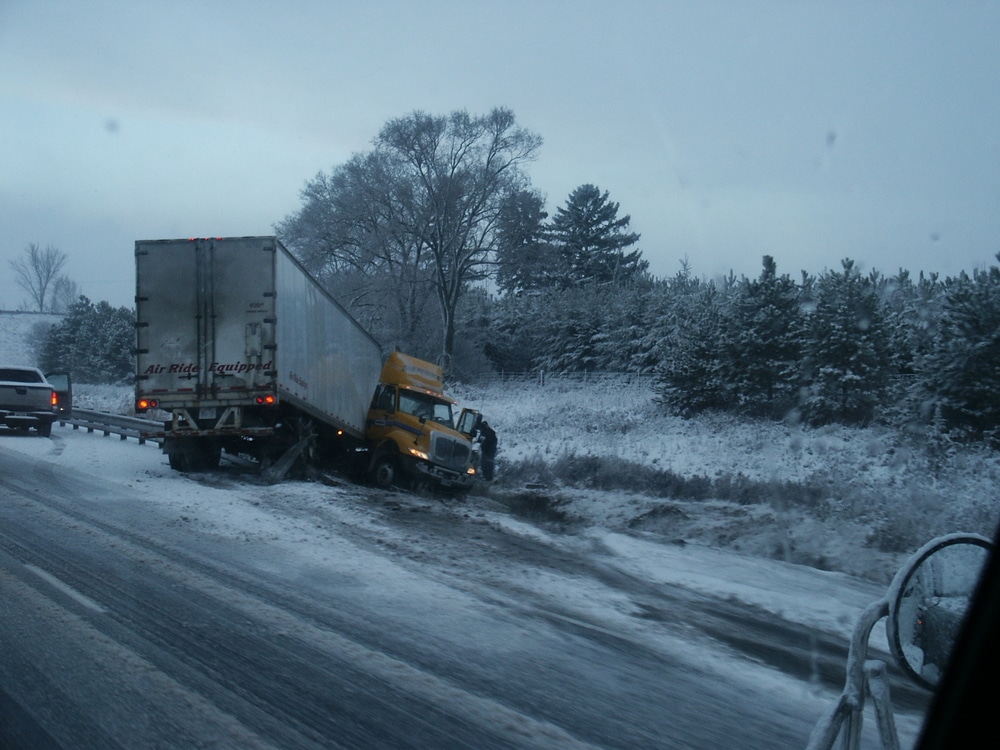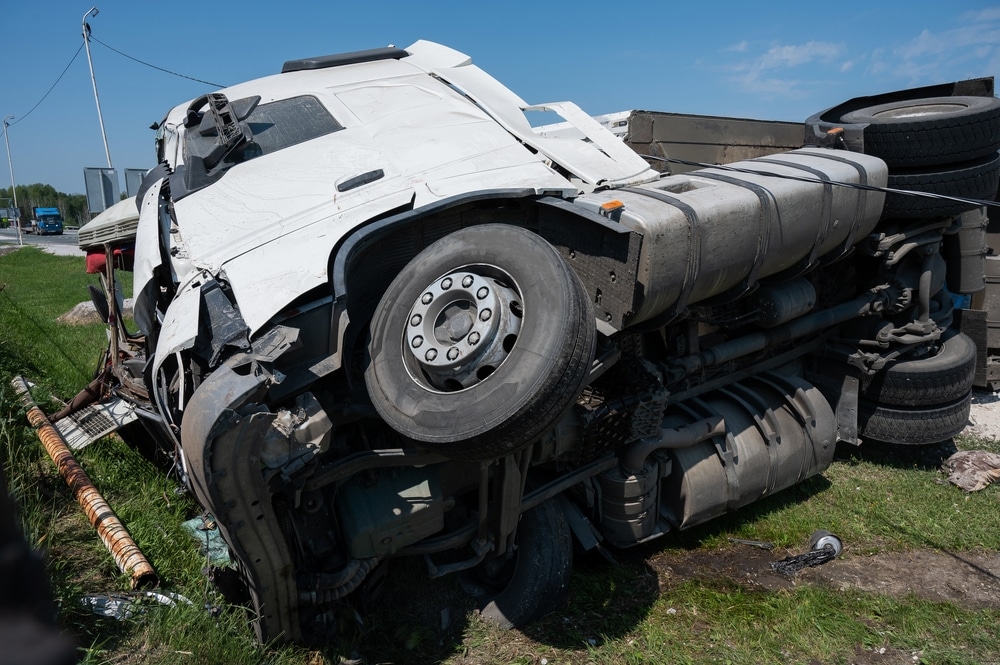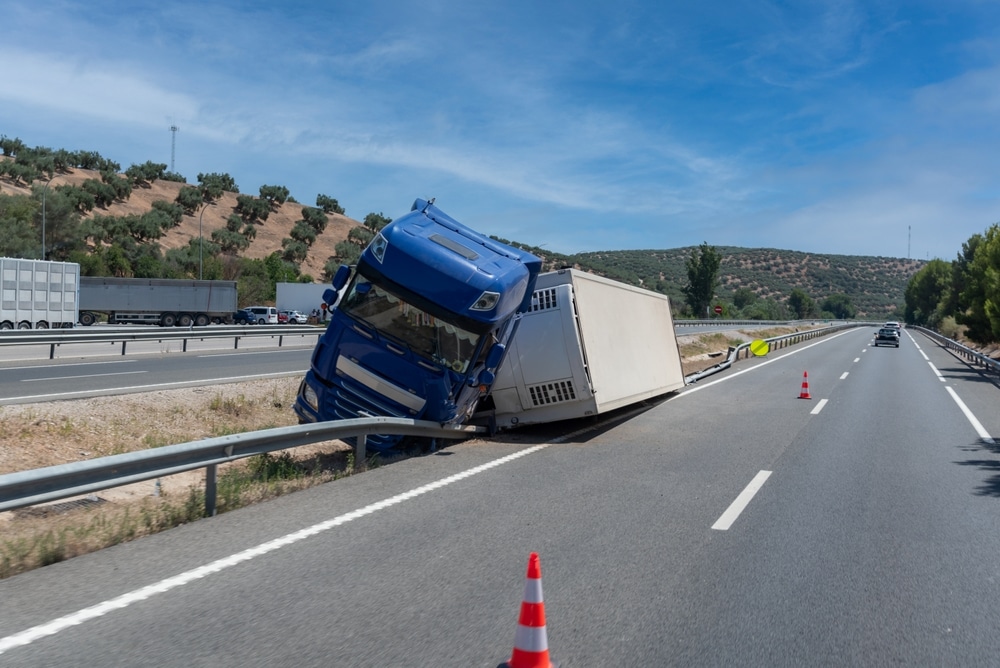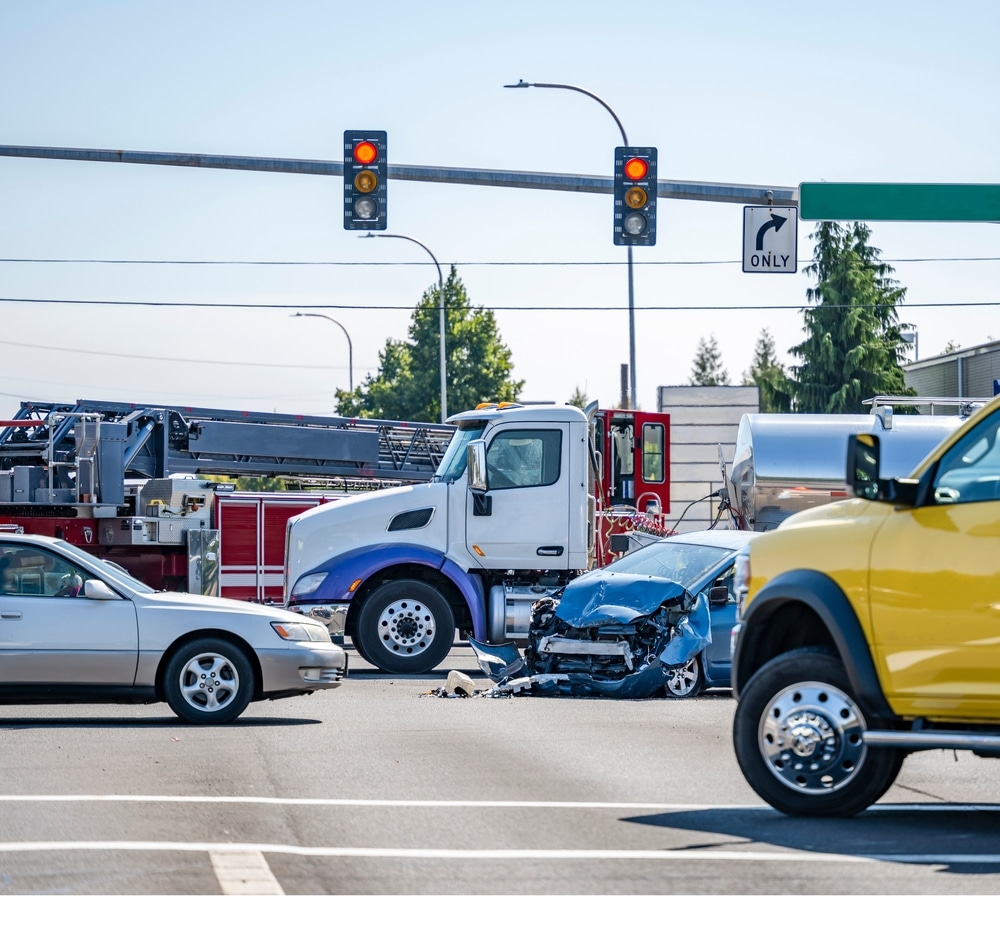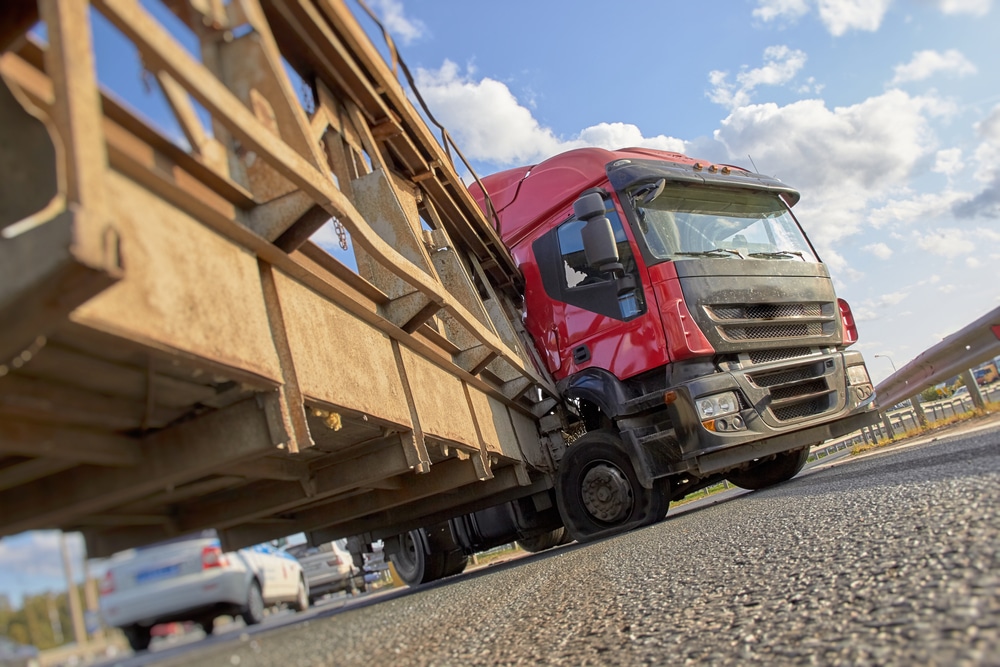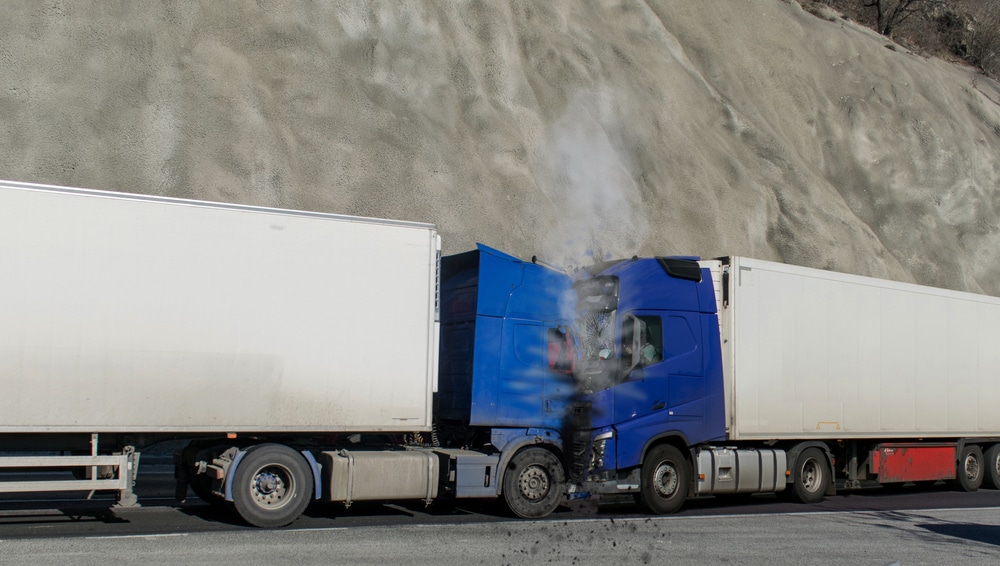A truck accident claim in California is a legal process that allows an injured person or surviving family member to seek financial compensation from those responsible for a truck-related crash.
The claim can be filed against the truck driver, the trucking company, cargo loaders, or other negligent parties whose actions caused the collision. It typically seeks payment for medical expenses, lost income, vehicle repairs, pain and suffering, and other related losses.
Truck accident claims in California often involve commercial insurance carriers and federal trucking regulations, which means the process includes collecting evidence such as electronic logging device (ELD) data, maintenance records, and employment logs to prove negligence.
These claims are handled through third-party liability insurance, and victims may also recover damages through the trucking company’s commercial general liability (CGL) or excess coverage policies.
When settlement negotiations fail, the claim becomes a civil lawsuit filed in California Superior Court, where discovery, depositions, and expert testimony are used to establish the value of the damages and prove fault.
How to File a Truck Accident Claim in California
1. Case Evaluation and Evidence Review
Once you hire a truck accident attorney in California, the first step is a detailed case evaluation. Your attorney reviews police reports, photos, witness statements, and medical records to understand how the crash occurred and who may be responsible. They’ll also request data from the truck’s electronic logging device (ELD), GPS, and maintenance logs to secure evidence before it’s altered or destroyed.
Estimated timeframe: Within the first 1–2 weeks after hiring your lawyer.
2. Identifying All Liable Parties
Truck accident claims often involve more than just the driver. Your lawyer investigates potential liability among the trucking company, vehicle owner, maintenance contractors, cargo loaders, or parts manufacturers. In some cases, government entities responsible for unsafe road conditions may also be included. This step ensures every source of compensation is pursued.
Estimated timeframe: Typically completed within 2–4 weeks, depending on case complexity.
3. Calculating Damages
Your attorney works with medical and financial experts to calculate the full extent of your damages — including current and future medical expenses, lost earnings, property repairs, and pain and suffering. They also consider loss of earning capacity and other long-term impacts recognized under California law.
Estimated timeframe: Usually takes 1–2 months, depending on injury recovery and available documentation.
4. Filing Insurance Claims
Next, your lawyer files claims with all relevant insurance carriers — usually the trucking company’s commercial liability policy and possibly your own underinsured/uninsured motorist coverage. They handle all communication with insurers, preventing adjusters from pressuring you into accepting an unfair settlement.
Estimated timeframe: Filed within 30–45 days after enough evidence is gathered.
5. Settlement Negotiations
Most truck accident cases are resolved through negotiation rather than trial. Your lawyer uses the collected evidence, expert reports, and economic assessments to justify your claim’s value. They negotiate aggressively with insurance companies, and you have the final say on whether to accept or reject any offer.
Estimated timeframe: Can take 2–6 months, depending on insurer responsiveness and injury complexity.
6. Filing a Lawsuit in Court
If the insurance company refuses to offer a fair settlement, your attorney will file a civil lawsuit in the appropriate California Superior Court. This action pauses the statute of limitations and moves the case into litigation, where formal discovery, depositions, and expert testimony are exchanged to build a strong case for trial.
Estimated timeframe: Lawsuit filed within 6–12 months of the accident, depending on negotiations.
7. Trial and Judgment
If negotiations still don’t lead to a settlement, the case proceeds to trial before a judge or jury. Your lawyer presents evidence, questions witnesses, and argues for the maximum compensation allowed by law. If you win, the court issues a judgment requiring payment from the liable party or their insurer.
Estimated timeframe: Trials generally occur 12–24 months after the accident, though timelines vary by county.
Approximate Total Duration
From the date of the accident to the resolution of the case, a California truck accident claim can take anywhere from 6 months to 2 years, depending on injury severity, insurance cooperation, and whether the case goes to court.
How Much are Most Truck Accident Settlements?
In California, most truck accident settlements in 2025 fall between $75,000 and $500,000 for moderate injury cases, though severe or catastrophic accidents can easily exceed $1 million. The amount depends on the injuries involved, the available insurance coverage, and whether multiple parties share liability.
Commercial trucks in California must carry higher insurance limits — often $750,000 to $5 million in coverage — which means victims can recover significantly more than in standard car accident claims. Minor injury cases, such as whiplash or soft-tissue strains, may settle for $25,000–$100,000. Moderate injuries, including broken bones or surgery without disability, often reach $100,000–$400,000. Severe cases involving spinal damage, amputation, or traumatic brain injury may range from $500,000 to several million dollars, depending on medical costs and long-term impairment.
Settlements are calculated using economic damages (medical expenses, lost wages, future care) and non-economic damages (pain, suffering, and reduced quality of life). Under California’s comparative negligence law, the final payout is reduced by the victim’s percentage of fault. When insurers fail to offer fair compensation, cases may proceed to trial, where jury verdicts in truck collisions can exceed $3 million for life-altering injuries.
Disclaimer: The settlement amounts mentioned above are estimates based on past California cases and general 2025 market data. Every truck accident claim is unique, and actual results depend on specific facts, available insurance coverage, and the strength of the evidence.
Who is Liable in a Truck Accident?
Determining who is liable in a truck accident in California depends on how and why the crash occurred. Because commercial trucking often involves multiple companies and contracts, several parties can share responsibility under California’s comparative negligence laws.
The truck driver may be liable if the collision resulted from negligence such as speeding, fatigue, distracted driving, or driving under the influence. However, the trucking company that employs or contracts the driver can also be held responsible if it failed to properly train, supervise, or comply with federal FMCSA safety regulations, or if it encouraged drivers to violate hours-of-service limits.
If the truck owner is a separate entity from the carrier, they may share liability for poor maintenance or mechanical failure. Similarly, maintenance or repair providers can be at fault if the vehicle was serviced improperly or known defects were ignored. In cases where the crash stems from a faulty component — such as defective brakes, tires, or steering systems — the manufacturer or parts supplier may face product liability claims.
Other potential defendants include the cargo loading company or shipper if they overloaded or improperly secured freight, leading to a loss of control or rollover. Government entities may share fault when unsafe road conditions, poor lighting, or missing signage contribute to the accident. And finally, other motorists involved in the chain of events may also bear a portion of liability if their negligence helped trigger the collision.
Common Causes of Truck Accidents
Truck crashes in California often result from a combination of driver negligence, vehicle defects, and environmental factors. Because commercial trucks are heavily regulated under state and federal law, identifying the exact cause is key to determining liability in a claim.
1. Driver Errors
- Distracted driving: Using a phone, eating, or adjusting GPS while driving diverts a trucker’s attention and reaction time. Even a two-second glance away from the road can be catastrophic in an 80,000-pound vehicle.
- Speeding: Trucks require longer stopping distances; driving above posted or safe speeds is one of the leading causes of freeway collisions in California.
- Driver fatigue: Despite federal hours-of-service limits, truckers often drive beyond permitted hours to meet deadlines. Drowsiness slows reaction time and impairs judgment.
- Improper turns and unsafe lane changes: Trucks have large blind spots (“no-zones”), and failing to check them properly can lead to sideswipes or underride crashes.
- Intoxication or drug impairment: Driving under the influence of alcohol, recreational drugs, or certain medications violates both California Vehicle Code §23152 and FMCSA safety rules.
2. Vehicle and Cargo Issues
- Improperly loaded cargo: When cargo isn’t balanced or secured per FMCSA Part 393 standards, it can shift or spill, causing rollovers or jackknife accidents.
- Poor maintenance and inspection failures: Skipping required brake checks, tire replacements, or lighting repairs leads to mechanical failures on the road. Under California law, both the driver and carrier share responsibility for ensuring the truck’s roadworthiness.
- Defective equipment: Faulty brakes, steering systems, or tires may create manufacturer liability if defects contributed to the crash.
3. Environmental and External Factors
- Hazardous weather: Conditions such as tule fog in the Central Valley, heavy rain, or high desert winds can reduce visibility and traction.
- Poor road maintenance: Potholes, debris, missing lane markings, or inadequate signage — often under the responsibility of Caltrans or local agencies — can lead to loss of control or tire blowouts.
- Traffic congestion and aggressive driving: Dense traffic on freeways like the 5, 10, and 405 increases the risk of rear-end and merging accidents, particularly when drivers cut too closely in front of large trucks.
How do Truck Accident Claims Differ from Car Accident Claims?
Understanding how truck accident claims differ from car accident claims is essential because commercial truck cases in California follow different legal, regulatory, and insurance standards.
The first major difference is liability. In a car accident, fault usually involves one or two private drivers. In a truck crash, responsibility may extend to several parties — including the truck driver, the carrier company, the vehicle’s owner, the cargo loader, and even maintenance or manufacturing entities. California applies comparative negligence, meaning fault can be divided among all responsible parties, but commercial carriers are often held to stricter standards because they operate under the Federal Motor Carrier Safety Regulations (FMCSR) and California Vehicle Code §34501.2.
The second distinction lies in insurance coverage and compensation potential. While private motorists in California must carry a minimum of $15,000 per person in bodily injury coverage, interstate trucking companies must maintain policies ranging from $750,000 to $5 million, depending on the type of cargo. These higher policy limits make settlements larger but also lead to more aggressive defense strategies from insurers and corporate legal teams.
Truck accident cases also require specialized evidence and investigation methods. Attorneys must collect black-box data (Electronic Logging Device or ELD), driver qualification files, hours-of-service logs, maintenance reports, and GPS data — evidence not present in standard car collisions. Accident reconstruction and federal compliance reviews are often necessary to prove fault.
Finally, the severity of injuries and damages tends to be far greater in truck crashes due to the weight and impact force of an 80,000-pound commercial vehicle. This results in longer recovery times, higher medical costs, and the potential for catastrophic injury claims that include lifelong care, disability, or loss of earning capacity — elements rarely seen in typical car accidents.
Are Truck Accident Cases Difficult?
Yes — truck accident cases are generally more difficult than standard car accident claims because they involve multiple layers of liability, higher insurance limits, and strict state and federal regulations.
In California, commercial carriers must comply with the Federal Motor Carrier Safety Regulations (FMCSR) and the California Vehicle Code, which dictate driver training, maintenance schedules, and hours-of-service rules. Proving fault often requires analyzing complex evidence such as black-box data, GPS tracking, and driver logs — materials that trucking companies and insurers rarely release without legal pressure.
However, the added complexity can also work in the victim’s favor. Because commercial trucks carry substantially higher insurance coverage — often between $750,000 and $5 million — successful truck accident claims can result in far greater compensation than ordinary car accident cases.

 Call Us:
Call Us: 


